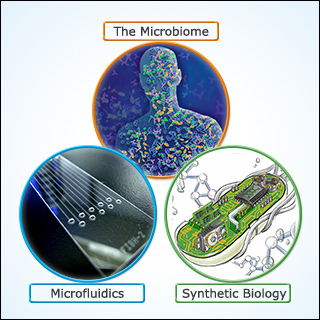
This course will explore the mechanistic insights and emerging tools that are transforming microbiome research, and how these might lead to new types of therapeutics and drug delivery for improving human health. (Synthetic circuit by Liang Zong and Yan Liang/L2molecule.com; human microbiome by Darryl Leja, NHGRI; microfluidic chip by Vincent J. Sieben, Wikimedia Commons. Image collage by MIT OpenCourseWare.)
Instructor(s)
Dr. Ali Beyzavi
Dr. Miguel Jimenez
MIT Course Number
7.341
As Taught In
Spring 2018
Level
Undergraduate
Course Description
Course Features
Educator Features
Course Description
There are more microbes permanently living in our gut than there are cells in the human body. This rich community of bacteria, fungi and viruses, called the microbiome, plays a central role in human health and disease. Recent research has linked this passenger community to nutrition, circadian rhythms, infectious disease, inflammatory disease, cancer, diabetes, arthritis and even immune system and nervous system development. How can we analyze such a complex system? Can we exploit the microbiome to improve human health? Can interactions with microbes be harnessed for drug delivery?
In this course, we will learn to critically assess the primary scientific literature to find answers to these questions and learn to distinguish between correlation and causality. We will learn how mechanistic insights and emerging tools, such as synthetic biology and microfluidics, together are transforming microbiome research, and might lead to new types of therapeutics and drug delivery for improving human health.
This course is one of many Advanced Undergraduate Seminars offered by the Biology Department at MIT. These seminars are tailored for students with an interest in using primary research literature to discuss and learn about current biological research in a highly interactive setting. Many instructors of the Advanced Undergraduate Seminars are postdoctoral scientists with a strong interest in teaching.


